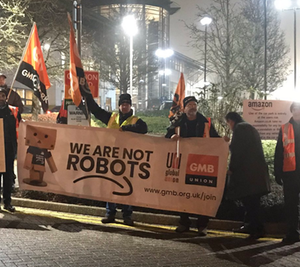On the same weekend that indie bookstores and indie businesses were celebrated across the country, many Amazon workers across Europe protested what they called "unsafe working conditions and low pay" by walking off the job at many Amazon warehouses in the U.K., Germany, Italy and Spain.
Hundreds of workers at five Amazon warehouses in the U.K. protested, the Telegraph said, citing GMB, a general trade union in the U.K. with more than 600,000 members. Tim Roache, general secretary of GMB, said, "The conditions our members at Amazon are working under are frankly inhuman. They are breaking bones, being knocked unconscious and being taken away in ambulances." GMB tweeted, using the hashtag #AmazonWeAreNotRobots, that "this #BlackFriday Amazon workers around the world have come together with one message for billionaire Jeff Bezos. We are not robots, treat us with dignity and respect."
The Washington Post--owned by Amazon founder and CEO Jeff Bezos--noted that 600 workers in two warehouses in Germany went on strike, and in Spain, the slowdown on Black Friday was aimed for "one of the days that Amazon has the most sales," according to the AP, which added that labor groups representing Amazon workers in Spain said 90% of the staff at an Amazon logistics depot near Madrid joined a walkout on Friday.
In Germany, the Verdi union said workers had walked off the job at two Amazon warehouses. Reuters reported that Amazon itself said some 620 workers were participating in the strike, but that the majority of workers had stayed on the job.
According to the Post, Amazon said: "Our European Fulfillment Network is fully operational. And we continue to focus on delivering for our customers and reports to the contrary are simply wrong."
The company added: "Amazon has invested over €27 billion and created over 75,000 permanent jobs across Europe since 2010. These are good jobs with highly competitive pay, full benefits, and innovative training programs like Career Choice that pre-pays 95% of tuition for associates. We provide safe and positive working conditions, and encourage anyone to come see for themselves by taking a tour at one of our fulfillment centers."
Reuters said that Amazon workers in Germany "earn a starting salary of €10.78 ($12.23) per hour and earn on average a monthly wage of €2,397 ($2,719) after two years." In the U.S., the company announced recently that it will begin paying a minimum of $15 an hour to warehouse workers.
---
In what makes for fascinating reading, on Wednesday, the Guardian published the first of a regular column written by an anonymous worker in an Amazon warehouse in the U.K. called "The Amazon Diaries." The initial installment, called "They Treat Us As Disposable," describes the author's first day on the job. He or she writes, in part:
"It's important to take a step back and realize what an Amazon fulfillment center really is. Prior to Amazon, the sale of stuff largely took place through physical stores. Enter a store and there can be dozens of employees, stocking shelves, managing the check-out counter, controlling inventory. The pace and rhythm of the day, at least compared to fulfillment centers, can be relatively relaxed.
"At Amazon, by contrast, we are not retail workers. We are factory workers.
"A single fulfillment center can contain 1,500-2,000 full-time workers, stowing, picking, packing, unloading, sorting, palletizing and delivering hundreds of thousands of items every day. Centers are filled with the whirl, grind, and moan of conveyor belts, the incessant drone of a forest of Kivabots moving shelves.
"We work hard, and diligently, to make Amazon run. While our collective efforts produce astounding results, we are supervised ever more intensively. Through the use of digital trackers and indicators, our workday is managed down to the second, with each task timed based on a 'rate' set by managers who push us ever faster. Work is often organized to keep workers from talking or even taking breaks, with this time considered 'off-task.' Like factory workers on the assembly line, we are essentially extensions of the machine."


